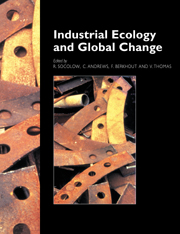Book contents
- Frontmatter
- Contents
- Foreword
- Preface
- Acknowledgments
- Contributors
- OVERVIEW
- PART 1 VULNERABILITY AND ADAPTATION
- PART 2 THE GRAND CYCLES: DISRUPTION AND REPAIR
- PART 3 TOXICS AND THE ENVIRONMENT
- PART 4 INDUSTRIAL ECOLOGY IN FIRMS
- 23 Introduction
- 24 Product Life-Cycle Management to Replace Waste Management
- 25 Industrial Ecology in the Manufacturing of Consumer Products
- 26 Design for Environment: A Management Perspective
- 27 Prioritizing Impacts in Industrial Ecology
- 28 Finding and Implementing Projects that Reduce Waste
- 29 Free-Lunch Economics for Industrial Ecologists
- PART 5 INDUSTRIAL ECOLOGY IN POLICY-MAKING
- END PIECE
- Organizing Committee Members
- Working Groups
- Index
29 - Free-Lunch Economics for Industrial Ecologists
Published online by Cambridge University Press: 04 August 2010
- Frontmatter
- Contents
- Foreword
- Preface
- Acknowledgments
- Contributors
- OVERVIEW
- PART 1 VULNERABILITY AND ADAPTATION
- PART 2 THE GRAND CYCLES: DISRUPTION AND REPAIR
- PART 3 TOXICS AND THE ENVIRONMENT
- PART 4 INDUSTRIAL ECOLOGY IN FIRMS
- 23 Introduction
- 24 Product Life-Cycle Management to Replace Waste Management
- 25 Industrial Ecology in the Manufacturing of Consumer Products
- 26 Design for Environment: A Management Perspective
- 27 Prioritizing Impacts in Industrial Ecology
- 28 Finding and Implementing Projects that Reduce Waste
- 29 Free-Lunch Economics for Industrial Ecologists
- PART 5 INDUSTRIAL ECOLOGY IN POLICY-MAKING
- END PIECE
- Organizing Committee Members
- Working Groups
- Index
Summary
Abstract
The industrial ecology debate is examined in terms of economic games between firms and their employees. On the one hand, investments for better industrial ecology are subject to ‘incentive-compatibility’ problems that could stymie their implementation; on the other hand, a great deal of improvement may be achievable by taking advantage of existing win–win situations (‘free lunches’), i.e., changes that improve both economic growth and the environment. Moreover, properly assessing the economics of industrial ecology requires a careful treatment of dynamic issues. For example, the total cost of pollution abatement becomes dependent on the historical sequence of regulation.
Descriptively, industrial ecology is the study of the interactions among industries and between industries and their environment; it seeks to understand what industry is doing to itself and to the environment in which it operates. Prescriptively, some authors have stated, industrial ecology seeks to ‘optimize’ the total materials cycle from virgin material, to finished material, to component, to product, to waste byproduct, and to ultimate disposal. Factors to be ‘optimized’ include resources, energy, and capital. Prescriptive industrial ecology advocates a deliberate restructuring of industrial activity to achieve this optimization. The nature of this optimization, however, is not as simple as it first might seem. Does ‘optimization’ imply minimizing resource use, minimizing environmental degradation, or ensuring that economic subsystems are environmentally sustainable? And what about a firm's profits? Are they also to be optimized or are they to be maximized? Each of these objectives leads to a different pattern of input use and production (see chapters by Graedel and Socolow in this volume).
- Type
- Chapter
- Information
- Industrial Ecology and Global Change , pp. 383 - 398Publisher: Cambridge University PressPrint publication year: 1994
- 11
- Cited by



